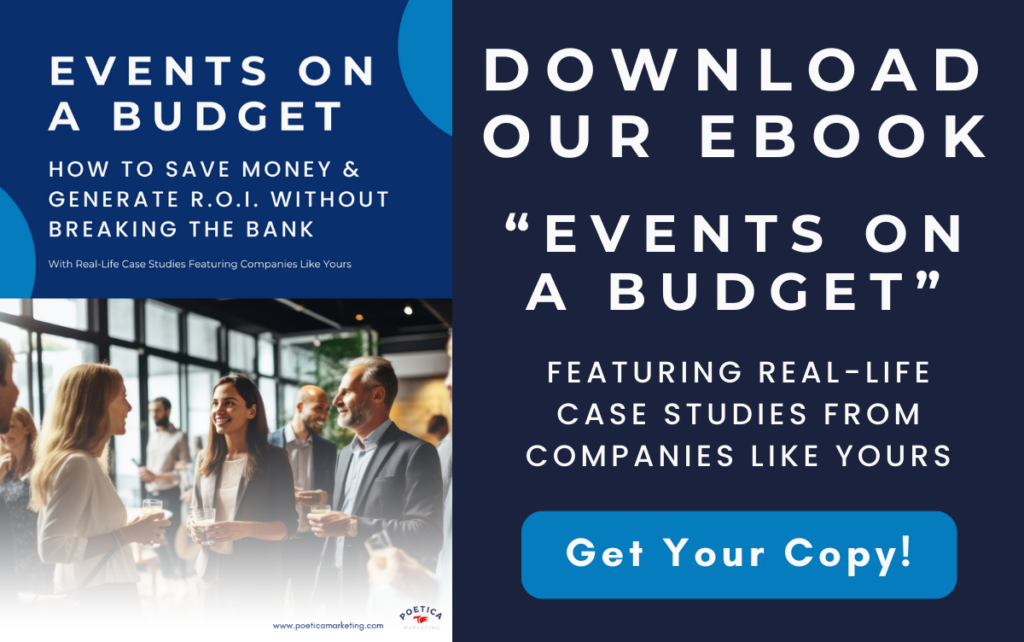How to Plan a Corporate Event: 6 Questions To Make Your Event Matter
Hosting a corporate event can benefit your business in big ways. A corporate event is more than just a party, and it’s more than just fun. In my last blog, “5 Reasons to Host a Corporate Event,” I explained that an event can help a business make invaluable connections with the community, create the foundation for trusting relationships with prospective clients, and so much more.
Today, we’re exploring how to make sure your event matters; how to do more than throw a party; and how to make every penny worthwhile.
In order to give your event purpose and really zero in on what will make your event matter, you need to answer these six questions before you begin planning:
- Why do you want to host an event?
- Who are your guests going to be?
- What kind of event accomplishes your goals?
- Where should you host the event?
- When should the event be?
- How are we going to make it all happen?
Let’s explore each of these questions and why it’s so important to have concrete answers during every step of the process.
Learn about our events strategies by downloading the Events On A Budget eBook.
Questions You Should Ask To Make Your Event Matter
Answering the Why? Who? What? Where? When? and How? long before you begin seriously planning your corporate event allows you and your team to zero in on what is going to make your event matter.
Question 1: Why do you want to host an event?
This is the first and arguably the most important question to keep in mind as your event grows from an idea to a reality. Why do you want to spend the time and money on an event? And why should you invest in an event rather than another avenue — like advertising, for example? Why is this event important to the growth of your business?
The answer to “Why?” could be: “To meet prospective clients!” or “To give back to our employees!” or “To network and bring business to fellow professionals in the community.”
The answer to “Why?” is uniquely yours, and having a solid answer is as important as having a business plan or a quarterly goal. The “Why” gives you and your team a focus, a reason to proceed, and a way to look back and gauge how successful the event was in the end.
The worst-case scenario is when guests leave an event thinking, “That was fun, but what was the point?” They may immediately forget about your business if it wasn’t clear who the host was. They may not come back to do business with you because they weren’t given a clear call to action. Answer the “Why” and remember how important it is to keep that answer at the core of your event.
Question 2: Who are your guests going to be?
The answer to this question is often a given once the answer to “Why?” has been established. For example, if you’re going to dedicate an appreciation dinner to your employees, you’ll have to invite your employees.
But sometimes the answer to “Who?” is a little more complicated. For instance, looking for prospective clients, possible donors, or potential partners requires a more specific answer than just “anyone!”
Just as it’s important to market your product or service to a certain target audience, it’s important that the right people attend your event. Sometimes it’s best to create an “invitation only” event to have more control over who attends, but when the event is open to the public, it’s important that the majority of attendees fit the demographic you’re hoping to reach.
Knowing who you want to attend your event will affect the location of the event, the style and dress code of your event, and the way you market your event (and to whom).
Your money and your time will be better spent when the appropriate crowd attends your event and they know why they’re there.
Question 3: What kind of event accomplishes your goals?
The answer to “What kind of event?” doesn’t have to be the most obvious answer. For instance, a networking event can be as creative as “F* Up Night” where speakers and guests celebrate the best and worst of their professional F* Ups, or as unique as a “Nerd Nite” where a room full of strangers engage in “speed friending” for the evening.
Regardless, your answer to “What?” should completely support your “Why?” You can be as creative as you’d like, but if the “Why” gets lost in the fun, then the event will fall flat, and your results won’t be what you wanted.
For example, a fundraiser is a great event that can become so much more than just asking for money and writing checks. To learn more about fundraising tactics, read our blog: How to Host A Nonprofit Fundraiser
To that end, I once designed the lighting for a theater festival fundraiser where the theater company wrote, produced, and performed six mini plays within 24 hours. During the public performances, a host/emcee engaged directly with the audience to remind them to donate, make bids, and support the company in every way possible.
The entire evening was hilarious, entertaining, and also a huge success for the company because they knew how to make the fundraiser fun and still kept the guests focused on the main goal of the event: to raise money for their company.
Question 4: Where should you host the event?
The “Where?” and “When?” of an event can go hand-in-hand. Sometimes the perfect venue is only available at a certain time, so the “when” depends on that availability. However, I encourage my clients to really consider the importance of their venue and the timing of the event. Try not to let one determine the other too much.
You may have noticed a pattern here: Most of these six questions are interdependent of one another. Likewise, “where” you host an event has a lot to do with what your goals are, who is expected to attend, and what kind of event you’re hosting.
I have three important tips to keep in mind when deciding on a venue:
- Don’t blow your budget on looks alone. The fanciest, most expensive venue isn’t always the best option, and oftentimes, a more affordable option that supports your event more effectively is right around the corner.
- When looking for a venue, consider your goals, your guests, and the type of event you’re hosting and then dive deep into the pool of possibilities.
- Make sure your venue allows you to have the flexibility and creativity your event calls for.
We’ll talk more about finding the perfect venue in a future blog, but for now, check out some of Pittsburgh’s most popular spots in our blog, “Top 20 Venues for Corporate Events in Pittsburgh: Impress Your Guests.”
Question 5: When should the event be?
Two words: Plan ahead!
There is no need to rush into an event. Take your time. Consider each of the six questions we’re going over now, and then give yourself and your team enough time to plan accordingly.
When considering when an event should be, think about the purpose of your event and how it might be beneficial to get out in front of the public at a certain time of year. For instance, weddings tend to have a season, as does the housing industry (in this case, they both tend to favor the summer).
Sometimes, weather can be a factor in when to hold an event. If you’d like to host something outside, chances are you’ll want to do so when it’s warm out.
Other factors to consider when choosing when to hold an event are the fiscal year, holidays, and your business’ internal calendar. Try to work with these factors, and allow your event to benefit from the timing you choose.
Question 6: How are we going to make it all happen?
“How?” may be the scariest question to answer, but it doesn’t have to be.
How are we going to plan this event? How are we going to pay for it? And how are we going to make it happen?
Let me break this section down for you, so it’s a little less overwhelming:
- Consider hiring an events coordinator. The more support you have, the better.
- Answer these six questions to give your event focus and purpose. Your answers will guide you in the early stages of event planning.
- Research! Taking the time to research different venues, caterers, rentals, and promotional materials will help you determine how much the event will cost your business, and how much time you’ll need to get every detail to come together perfectly.
- Create a task list and a calendar leading up to the event. Doing so will ensure that everything is researched, booked, ordered, and set in time for the event, so there is a limited amount of “crunch time” during the week before the event.
Remember, friends, your event should benefit you and your business — it shouldn’t be a burden.
Stay organized, stay focused, and ask for help. My contact info is at the bottom of this page 😉
Make Your Event Matter
Every event should have a purpose — a “Why?” — and once that purpose has been established, the answer to the questions, “Who? What? Where? And When?” will come somewhat naturally. The “How?” can still be a little intimidating, but we’re here to help. A corporate event can pay for itself when the outcome leads to customer loyalty, employee satisfaction, or fulfills whatever goal you set out to achieve.
Check out our events page and contact me at regina@poeticamarketing.com if you have an event you want to plan. We can tackle it together!
Learn more about our events strategies by downloading the Events On A Budget eBook.

